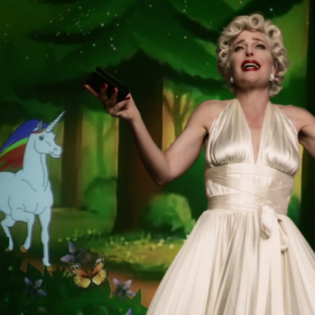 by David Graziano
by David Graziano Illustrator: Vincenzo Natali
on 28th May 2017
Genres: Adult, Fantasy, Paranormal Fantasy, Urban Fantasy

Shadow struggles to make sense of his wife's return and her desire to be in his life, but the tense reunion is interrupted when he and Wednesday are caught by the police for their bank scheme.
As it turns out, however, their being found isn't a coincidence. There are some very powerful people who would like a word with the both of them...
*
Because I feel the need to make some kind of Point™ every time I write one of these, I’ll start off this week by making an observation regarding book-to-film adaptations.
It’s funny because, all things considered, my demands for faithfulness to the source material should not be all that hefty with this go-around, seeing as how:
- I’ve only read the book once, and it wasn’t as though I particularly loved it. I enjoyed it, certainly, but I likely would never have bothered with it if it hadn’t been receiving a screen treatment, so it’s not as though it’s a story I’ve grown up with and read a dozen-plus times.
- I was fully expecting (and outright hoping) that the show would differ from Gaiman’s text, because my biggest complaint regarding the latter was that there was a lot of potential in the premise that wasn’t fully mined.
- Thus far, the series has been very, very good at balancing out its old and new elements. So much has already been directly pulled from the pages and retained almost verbatim.
- And as for the new stuff, it’s all been very agreeable. Most of it has just added to characters and moments that in the text weren’t all that detailed to begin with (and therefore isn’t technically contradicting anything in the story). Or, if it has legitimately changed something, it’s arguably done so for the better, either making more sense for television or simply being more interesting.
I find it very annoying, then, that my reaction for these last two episodes has been the same. No matter how well the show is doing or how capably it’s meeting my expectations, my initial, gut reaction has been “this wasn’t in the book, and therefore sucks.” I’ve had to force myself to think about what I watched because, given a bit of time, I eventually end up really liking what the writers have done.
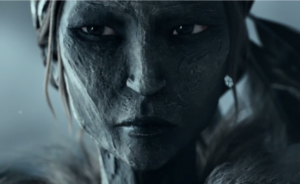
It just goes to show how strong that idea of ‘faithfulness’ is to reader opinion, context be damned. No matter how ill-advised, unnecessary, or outright impossible it is , we apparently can’t help but view a 100%, shot-by-shot duplication of the text as the Holy Grail of adaptations.
I hope I get over this soon, though, because I’m under the impression that the rest of this season is more or less going to be new. I get the feeling that they’re saving Wednesday’s meeting of the Old Gods for the finale, which, in the novel, takes place right after the bank heist. Had they been sticking to Gaiman, they should have already gotten to that last week.
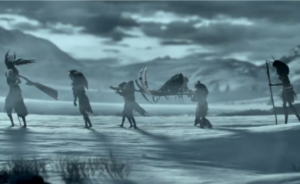
And I like the idea of saving that particular sequence for our first final episode; it’s a good stopping point and dramatic cliffhanger, so I need to stop complaining.
Anyway, “Lemon Scented You” is, as you’ve guessed, a sort of milestone for the show, as it’s the first episode that really breaks away from the book. Granted, “Git Gone” did as well, but in a different way: because it took place entirely in flashback and focused on a time period that was never a part of the primary plot, it (mostly) didn’t conflict with anything.
Episode five, however, certainly does, as we’re back on Shadow and his journey. As I’ve said, since the writers seem to be saving the next big plot development for week eight, they’ve got a few hours of time to pad out until they get there.
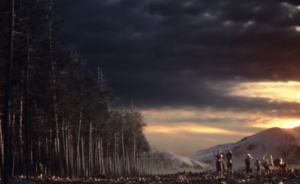
When I say ‘padding,’ by the way, I’m not using it in the negative sense; I think that the direction that the writers are taking is an important step in better developing the cast and world, which is something that they’ll need to do to keep things going smoothly for another few seasons. I use the word instead in context of how they’re doing, well, exactly what I wanted them to do: using the book’s major scenes as milestones to pace out the story year by year, so that they can slip in between them their own ideas without detracting from the core plot.
So, like with “Git Gone,” my initially mixed feelings for “Lemon Scented You” have given way to appreciation. It’s an hour that has really grown on me since I watched it, and I’m now very happy with the results. Aside from the opening ‘Coming to America’ vignette, everything is new, and I think it all pretty much works.
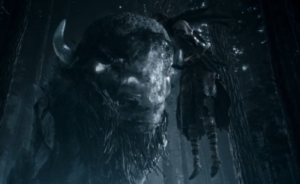
Don’t say your parents never did anything for you, kids.
That’s largely because the episode’s focus is on something that I considered one of the book’s most lacking elements: the New Gods. My complaint there was that they, despite being the primary antagonists, had very little screentime. Despite their fascinating concept, they really didn’t do much except for lurk around the edges of the story, their threat mostly coming from us being told, not shown, their power. While I’m still hoping/waiting for some additional gods to show up, I’m at least pleased that we’ve now gotten much more of the preexisting ones than we ever did before.
As a whole, this episode really helps establish their control, their danger, and the fact that they aren’t completely ignorant of Wednesday’s schemes to stop them. Since they really didn’t bother doing anything about the man’s plans until the last possible moment in the novel, the New Gods ended up coming across as foolishly overconfident, completely naive despite their omnipresence, or both. Thanks to this week, we now have a much clearer and direct opposition to root against, and what passiveness they still continue to show is well explained.
Anyway! Let’s take a look:
Spoiler Warning
Below are spoilers for both the episode and the book, so continue at your own risk. Going forward, I’ll try to avoid too many mentions of later events, so as long as you’ve watched, you should be okay. Hopefully. No hard-and-fast promises, though.
*
Coming to America
14,000 B.C.
In our only nod to the book, we start with a flashback (narrated by Mr. Ibis) to a very distant past, in which a tribe makes its way to America over an ancient land bridge from Siberia. In an interesting surprise, it’s also animated — and really well, too, using a lovely stop-motion-esque style in which all of the characters appear to be made of wood. It reminds me of a Laika film, or perhaps that equally surprising sequence covering “The Tale of the Three Brothers” in Harry Potter and the Deathly Hallows.
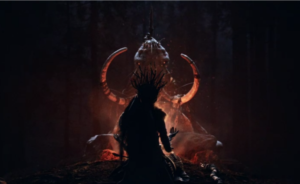
Atsula leads her people through the bitter cold, forced to bury the child she loses to the harsh elements along the way. They travel with their god Nunyunnini: a mammoth skull that they carry with them. They finally encounter the warmer weather and woodlands of the continent, but the food that they expected to find is absent — only bones scatter the forest floor. One evening, Atsula communes with Nunyunnini, who answers her plea for help with a vision showing her what she must do. During their journey, an enormous buffalo made of ice appears. As per her vision, Astula allows herself to be impaled by the beast and carried away. Another tribe native to the land appears and offers the travelers food, but the other of their elders rejects it. He is killed in response, leaving the children to accept the offering. They leave Nunyunnini behind, and as ages past, his bones — and his name — rot away.
Like I said, it’s a nice surprise to start things. No ‘writing in a book’ shot to lead into it, but I suppose showing that every time would get repetitive, as there are only so many ways to film somebody jotting something down before it gets stale. At least Ibis is narrating as he has been, to keep things thematically consistent.
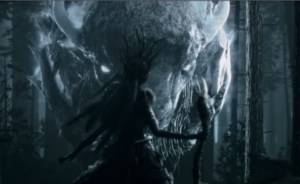
There’s a metaphor here; I’m sure of it.
I was a bit confused by the storyline here the first time around, so I had to watch it a couple of times to get the tale — it’s a much-abbreviated version of the final ‘Coming to America’ aside from the novel, which was a bit more elaborate involved. Its importance to the plot, however, is the same: gods, as Ibis explains, are powerful, but people are even more so, because gods live and die by those who believe in them. Once that belief wanes and moves on, formerly unstoppable beings are left to dust. Hence the symbolism of Atsula being killed by the buffalo: she (and Nunyunnini) recognized that, in order to survive in a new land, they had to change, and so they both offered themselves to a new god so that their people would find acceptance with those of the foreign land.
It’s a nice tie-in to the main story’s theme, and looks absolutely lovely to boot. I wouldn’t mind more ‘experimental’ sequences like this, but I also find this one in particular a tad disappointing, if only due to matters of representation. The writers explained that the decision to use animation was mainly due to financial constraints, which is understandable — the season was apparently made as short as it is because they went over budget. And while I think that having something like this is possibly preferable to some other alternatives (a really cheap-looking live-action setup, for instance, or just having the scene cut entirely), it also feels like a missed opportunity to get some Native actors involved in the cast. Considering how white the lineup is right now (more on this later), it’s a shame.
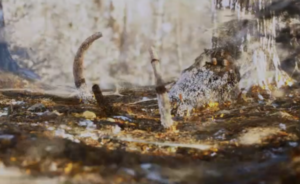
(It also makes me worry about how well they’re going to actually handle things when they introduce bona-fide Native characters and beliefs into the plot, which do show up in the middle portions of the book. Considering this bit and the fact that the show has already used other imagery — the totem pole in the credits, a buffalo skull in one of the advertisements — I worry that things are going to turn into appropriation, not appreciation, real fast.)
*
Present Day
We start off — again — in the motel room with Laura Moon, who is waiting for Shadow to return. He shows up, and is understandably upset. He angrily tells her that they have unresolved issues to discuss, which Laura tries to shrug off by pointing out that the fact that she’s alive again is a rather big thing.
Shadow, however, doesn’t find it particularly impossible, given what’s happened recently, and demands that she explain her cheating. Laura tells him that she was legitimate when she said she would wait for him, but knew that the statement had a chance to be a lie. As it turns out, he was only in prison for thirteen months before she slept with Robbie for the first time. She uses the excuse of her cat dying and getting drunk, and when Shadow asks is she intended to leave him, she dismisses the idea, saying that she loves him.
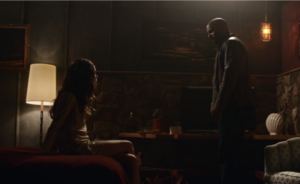
Shadow asks her to describe the night she died, which she does. She mentions her time in the afterlife only as being “somewhere,” and neglects to tell Shadow about her saving him. She then asks for a cigarette, which Shadow agrees to buy from the motel vending machine.
So far, so good. The dialogue is a mishmash of direct quotes from the book and some new stuff, as befitting the more elaborate backstory they gave Laura last week. There’s a lot more emotion involved on both sides, too, which is nice. The novel’s version of this scene was very brief and rather flat, due to Laura’s one-dimensional ‘otherworldly’ portrayal and Shadow’s general apathy, which worked in its own strange way on paper, but probably wouldn’t have been very compelling on screen.
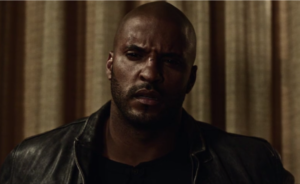
As a result, I’m liking the change the dynamic takes — it’s more believable. Whittle plays Shadow with a perfectly subdued combination of heartbreak and fury, and his immediate acceptance of the situation still keeps him very much in-character despite the other changes. Browning, meanwhile, makes it clear that show-Laura is indeed going to be notably different from book-Laura.
As what happened with her past being expanded on last week, it’s not necessarily a change in the sense that it’s completely contradicting how she was already established. It’s more that the writers filled a rather empty character with a more explicit sense of personality and direction, and I like the direction they chose. As “Git Gone” made clear, Laura is, quite frankly, full of shit. Despite her claim that she has miraculously found a genuine love for her husband since her death, her flippant attitude toward Shadow’s understandable anger and despair makes it clear that she isn’t genuinely remorseful for her actions or cares for her “puppy.” She never actually apologizes once, instead meeting every one of Shadow’s statements with her own pre-planned speeches and justifications that distract from her own fault. None of this particularly clashes with book-Laura, mind you; it’s mostly a ‘sharpening’ of the same offhand way that she spoke and behaved in the text, retaining the elements but removing most of the ambiguity.
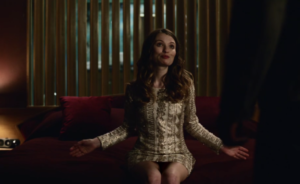
Truly the face of somebody genuinely remorseful for her poor life choices.
And Browning plays her beautifully because, despite how terrible she is, you can’t help but want to see more of her. She’s going to be a character that you love to hate, I expect, and I think that’s an excellent way to fill out what was initially such a blasé story element. It may not be the ideal emotion to feel towards her, but at least you’ll be feeling something, and that’s always better than completely disinterest.
(See, filmmakers? This is how you adapt a book. Make changes to the weaker stuff to give it a bit more life and excitement, and leave the really important stuff intact.)
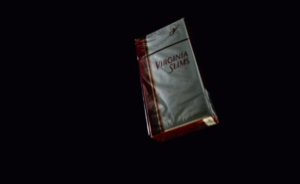
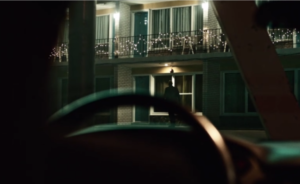
While heading back to his room, Shadow notices a black car in the parking lot. A raven sits on the roadside sign and watches. When he returns to his room, he finds Laura in the tub. She tells him she wants to warm herself up, just in case he wants to touch her. He tells her that people who die usually stay in their graves, but Laura isn’t so sure.
The raven flies down a hallway and taps on Wednesday’s door. When it caws at him, Wednesday tells the bird to “slow down.”
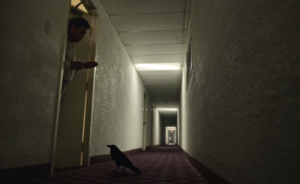
“Sir, have you heard the Good Word? The Good Bird Word?”
Laura complains that she can’t taste her cigarette, and Shadow leaves her wedding ring on the tub. He mentions the last time he called her in prison, saying that he had the feeling that she would die. A storm is rolling across the country, he says, and everything feels wrong.
Laura gets out of the tub and kisses Shadow, saying that their marriage needs to be worked on. Doing so causes her heart to momentarily beat again, and she notes that she felt alive for just a moment. She tells Shadow that dying made her realize how much she loves him, and warns him that he’s gotten himself mixed up in “some weird shit.” She is, however, looking out for him, and she thanks him for his “present” — the coin that he left on her grave. Shadow mentions that Sweeney is looking for it, but she refuses to give it up. She asks Shadow if he’s still her puppy, but he tells her that he is not.
More dialogue straight from the book. I like how they’ve stuck to the original script but interwoven the scene with so much more context now that they’ve fleshed Laura out. The only notable change is Laura’s momentary resurrection, which creates a lot of interesting future implications.
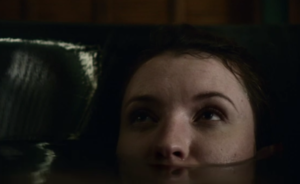
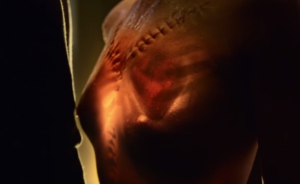
Namely, it suggests the possibility of a redemption arc for her, in which she not only tries to make up her actions to Shadow, but also pursues legitimate life again. This ties in nicely with her new characterization and backstory, because it means that she once again has a reason to use Shadow for her own ends — just as she tried to rely on him to make her feel alive in the past, now she can do so in order to actually be alive. It’s a clever echo of “Git Gone” and could lay the groundwork for a fascinating direction for her development in later seasons: Will she protect Shadow because she wants to legitimately love him, or simply play the charade as she once did to get what she wants?
It’s an excellent idea, I think. With one fell stroke, it gives last week’s episode an entirely new level of importance while creating an entirely self-sustaining narrative for her to pursue. Much better than leaving her to wander in and out of the story at random intervals.
And I hate Browning for this, because no matter how satisfying that “no” from Shadow was when she asked him if he was still her puppy (good for him!), I still sort of felt bad for her. I know, I know.
Wednesday shows up at the door, claiming he can’t sleep and asking Shadow out for a drink. Shadow is understandably uninterested, but won’t tell Wednesday why (another tweak — he seemed pretty willing to talk about his wife returning in the book, but I suppose this is good for drama). Wednesday suspects that something is up, but they’re interrupted by a crew of police cars pulling up. The lead officer (Tracy Thoms) tells them that they’re being arrested for bank robbery.
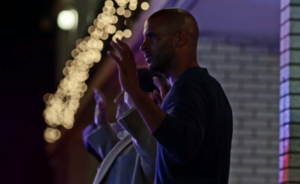
Quick aside: The use of the raven is fun, but it takes some of the mystery out of Wednesday, doesn’t it? This shows up a couple of other times in the episode a bit later, and with these moments, the writers have outright skipped the question of who Wednesday actually is, which was something that Gaiman put off completely revealing until the Old Gods’ gathering. It also makes it pretty obvious that he was involved somehow with Laura’s death, considering the reappearance of the birds.
Then again, the show, just as the book did, gives you one of his names right off the bat when Czernobog calls him “Grimnir,” and all it takes is a quick Google search to find out what god that name refers to. And let’s be honest: if they’re going to be delaying the bigger scenes, the writers are probably going to have to throw in some of these revelations earlier so as not to pointlessly string audiences along, especially when half of the viewers already know what they are and the other half are probably going to be able to guess them really early.
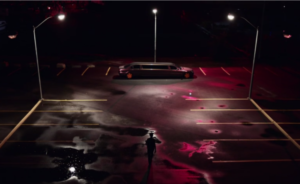
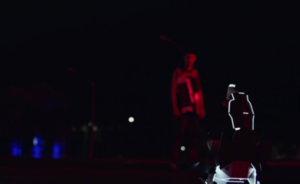
Elsewhere, the Technical Boy leaves a very fancy party involving lasers and very loud music, because that’s what a person named the Technical Boy would do. The streetlights in the parking lot go off as he approaches his limo (nice callback to the pilot), only he isn’t the one doing it this time. He spots his VR goggles on the ground nearby, which latch themselves onto his face before he can do anything.
Back in his virtual car, he’s greeted by Media, who’s now rocking a Ziggy Stardust look. She chastises him for his meeting with Shadow — he was only meant to ask him a few questions, and instead ended up hanging him. Lynching a black man looks very bad these days, she points out, and warns him that a very displeased Mr. World demands an apology to try to salvage the situation before it gets any worse. The Technical Boy gives a very insincere one to Media, who tells him that World wants it delivered to Wednesday and Shadow themselves.


♪ “There’s a staaaaaarmaaaaaaaan…” ♪
The Technical Boy complains that Mr. World is letting Wednesday “get away with it,” but Media tells him that things were going just fine until he got involved: the con man’s plan was falling apart, as he isn’t the most persuasive man, but the attack on Shadow lets him play the martyr, which will add a new spark to his campaign. The Technical Boy claims that no apology from him is going to stop Wednesday’s recruitment, which he refers to as a “mass delusion.” Delusion, Media notes, is plenty powerful — it can incite panic and action, and to get that, Wednesday doesn’t even need all of the Old Gods to believe. Just enough. Maybe even just one.
A great addition that finally gives us more of the New Gods. I’m a bit torn on a couple of aspects regarding these two, but I’ll get to those in a bit. Otherwise, it’s a treat to see Gillian Anderson in another get-up. She certainly looks the part, and does a pretty solid Bowie impression, though the fact that her dialogue is sprinkled with the artist’s lyrics is sort of corny. And the Technical Boy is very annoying, as is to be expected, but I appreciate the characterization here:
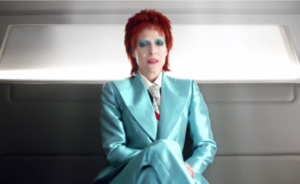
For Media, it’s important to note that her condemnation of Shadow’s hanging comes not from the fact that it’s a reprehensible crime, but that it looks bad for the New Gods. She doesn’t legitimately care about the emotions and implications behind such a horrific event beyond appearances.
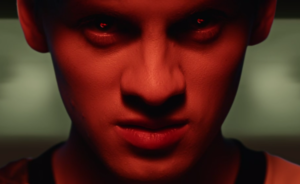
For the Technical Boy, it’s the odd mixture of dismissal and care that he displays towards Wednesday that interests me. He complains about Mr. World’s laxness in addressing the issue, but is simultaneously so haughty that he doesn’t appear to see them as a threat. His dialogue here does a solid job at giving us a clear idea of the New Gods as a whole: they’re too high and mighty to worry too much about any action taken against them, but are also smart enough to know that they have to keep track of things. Such a profile simultaneously retains the book’s ‘above-it-all’ attitude that fits a group in such a lofty position, but also makes them more credible villains by showing that their ego isn’t leaving them completely blind.
Side note: We haven’t really seen Wednesday use Shadow’s hanging as a tool to recruit, though, so I think that the writers are going to need to give us a bit of evidence of that to make Media’s claims credible.
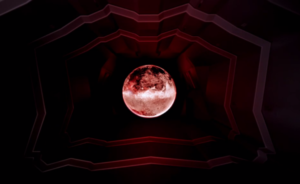
Back in prison, officers are grilling the pair. Shadow’s tells him that they somehow haven’t been able to find any information on Wednesday, but they know plenty about him. Wednesday’s, who wants to know why he was in Chicago, has to deal with the man playing senile.
(The show never actually gives us either of their names, but the credits peg them as ‘Buffer’ and ‘Cambro,’ respectively, so we’ll use those.)
Buffer warns Shadow that he’s getting involved in something bigger and more dangerous than he could know, that Wednesday has pissed of some very big, very powerful people. Shadow asks for a lawyer. Wednesday decides to tell Cambro the truth: he was in Chicago to recruit a god of death.
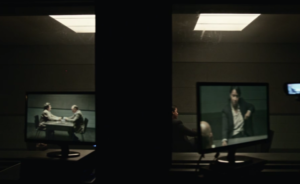
Buffer understands Shadow’s refusal to talk, but has the feeling that they’re dealing with something unusual, and so wants to delay the case moving forward. She asks if Wednesday has enemies, because the tip that they got wasn’t the usual type — it was a fax sent to a machine that hadn’t been turned on in years and gave an exact GPS location for the pair. Meanwhile, Wednesday talks about Sweeney’s resistance in getting involved in anything, due to the fact that he’s an idiot. Yancy (finally!), meanwhile, is not willing to throw in his lot, as he is one “bitterly dispossessed,” but Wednesday thinks that he understands his friend more now that he’s seen “the rope burns around his friend’s neck.”
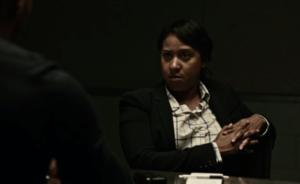
Glad to see Yancy getting mentioned, as we haven’t seen him since that ‘Coming to America’ bit a few weeks back. It’s tidy of the writers to tie that sequence, Shadow’s being attacked, and Media’s warning about martyrdom together like this to give him a certain rapport with Shadow before they even meet. It’s something that was sort of there in the book but not really explored from the angle of race, so I hope it’s handled delicately once he actually shows up.
Buffer shows Shadow surveillance camera photos that they were sent of the bank robbery. She asks to know what’s happening, but Shadow doesn’t think she can handle it. He considers the offer of help, though, wanting out as quickly as possible. She tells him that the DA could look at him leniently, given the death of his wife.
Speaking of which….
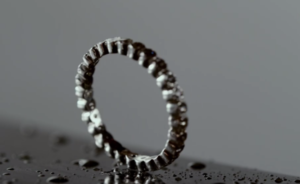
Back at the motel, Laura sits in the tub and looks at her wedding ring. As she dresses, the door is kicked in by Mad Sweeney, who demands she return his coin. He grabs her and looks down her throat, revealing the coin to be sitting in her stomach. Laura, in response, flicks him and sends him crashing into the wall, telling him that it’s hers now. When he tries to grab her, she breaks his hand.
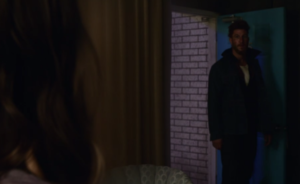
Sweeney tells her that he gave Shadow the wrong coin, that hers is meant for the King of America. She breaks his finger and pins him to the floor, and asks him how he knows Shadow. Sweeney tells her that he was hired to go to the bar where they first met and test Shadow to see what he was made of by Grimnir — also known as Wednesday — who is a god. (*gasp*) He warns her not to trust him, as Shadow has. He conjures a great many more coins to offer her, but she doesn’t accept them.
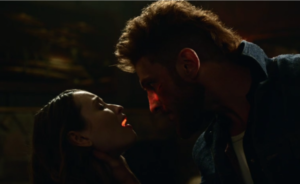
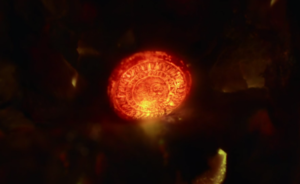
I wonder what else she keeps in there. Cash? Her personal journal? A light snack for later?
Laura goads Sweeney, guessing correctly that he can’t take the coin unless she freely gives it to him — something she says will never happen. The leprechaun points out that it probably will — her body is going to continue to rot, and eventually, she won’t be able to do anything at all.
He tackles her into the bathtub and chokes her in frustration when cops burst in and grab him. He tries to claim that she’s okay, but Laura plays dead quite literally in the water as he’s hauled away. She smiles.
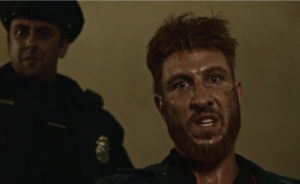
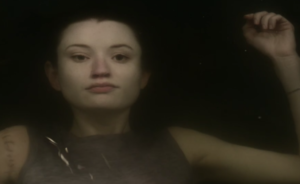
Fun scene. I like this idea of the two of them becoming a pair for their respective storylines going forward — as the writers have said, it’s entertaining as hell to see two jerks be jerks to one another, and they both play off one another well. (Also, props to the writers for openly acknowledging that, yes, both of these people are “assholes” — their words — and not meant to be sweet, innocent, immensely likeable cinnamon rolls. Though, from what I’ve seen, some fans would like to pretend that Sweeney is.)They also complement one another’s arcs smartly: Sweeney’s warnings help encourage Laura to keep an eye on Shadow while working to escape her eventual fate, while Laura’s possession of his coin gives us a chance to learn more about his dealings and why he needs it back so desperately — something that was never explained in the book.
So we’ve already been given one new bit of information regarding his predicament: apparently, that coin was for the “King of America.” Who, exactly, is that going to end up being, and why does he want this coin so much? I could hazard a few guesses and which god rules America (Mr. World? White Jesus?), but I’m content with waiting to find out. It’s nice to have some mystery in a story that you already know 97% of, after all.
And I guess I’ll be semi-invested in his storyline for now, then. Laura is an awful person, but like I said, she’s entertaining to dislike, and I’m at least sort of hopeful for some development on her part. Sweeney, however, just annoys the hell out of me — having a character be so constantly hostile and rude gets grating very quickly, and the fact that he feels the need to call somebody the ‘C’ word every time he shows up is starting to drive me up the wall.
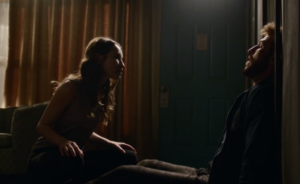
But, man, seeing Laura casually flick him across the room was kind of amazing. He seems to recover from his injuries pretty quickly, though. Do leprechauns have healing abilities? I’m going to assume that they do. And I wonder if Laura having swallowed the coin instead of simply wearing it around her neck is going to become a plot point at some point, or if it was simply done to look, uh, cool.
Shadow and Wednesday are left in the same room to talk. The lights flicker. While they’re alone, Wednesday warns them that they’re about to be killed unless they leave. The photos come courtesy of somebody you do not want to encounter before you’re ready. A spider crawls into Wednesday’s cuffs and unlocks one of them, claiming that it comes courtesy of a friend. Shadow grabs him, realizing that he’s afraid, and demands to know who he really is and who’s after him.
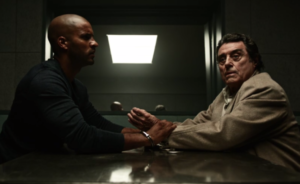
Gunshots ring out. The lights go out and the door unlocks to reveal Media, who is now posing as Marilyn Monroe. She floats into the room (literally), taking in with her a spotlight and a breathy discussion about how she’s no longer old black-and-white Lucy, but a glorious Technicolor creation whose death wasn’t quite as straightforward as people claim. Wednesday tells her that they have no business with her, but she insists that they will. Shadow starts to panic, as one probably would.
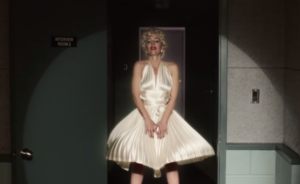
I’m not sure what I was expecting, but I know that it wasn’t this.
I think we’re seeing the culmination of Shadow’s recurrent struggles with disbelief, and now seems the perfect opportunity for it to hit its peak. I think the writers have drawn it out just long enough to be believable, but seem to be wrapping it up before it potentially turns into a nuisance.
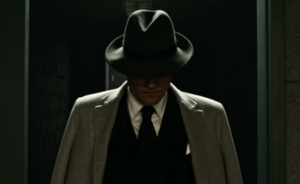
The cameras in the place go out as Mr. World (Crispin Glover) walks in. He says that his meeting with Wednesday has been long overdue, and that he hasn’t come until now due to how small and unimportant he seemed. Wednesday warns Shadow not to tell World anything, but World reveals that he already knows everything about Shadow; he in fact knows everything about everyone, including Shadow’s blood type, dreams, cheese preference, and mother’s sexual history. That’s what he deals in, you see: all of the information that is recorded, stored, and recalled. “The Book of Life,” he calls it.
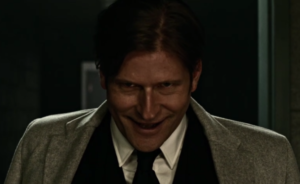
I’m pretty sure that Mr. Glover is just playing himself at this point.
I’m glad that he’s finally been introduced, but I’m sort of confused by World. For his part, Glover does him well. Granted, he’s more or less playing the same character he does in every role he gets: the snake-like smooth-talker who’s also clearly unhinged and prone to bursts of yelling. But, hey, it’s a character that works for him, and I think it’s a solid direction for Mr. World, if different. He wasn’t all that present in the book, anyway, so like Laura, this gives him a more definitive characterization and direction for the writers to take him in, rather than leaving him a half-formed, shadowy presence for most of the plot.
What I’m stuck on is his role as the head of the New Gods. I was sort of under the impression that this was what he was in the novel, too. Going back and rereading some of his scenes, however, makes me think that I was wrong about this. Now, I’m thinking that he was actually just a regular man who happened to be the head of the legmen who worked for the New Gods. (Granted, there are… some reveals at the end that contradict this, but up until that point, I think the assumption is that he’s a mook.)
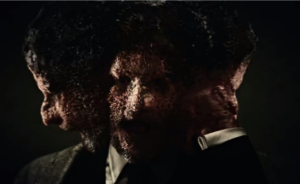
Correct me if I’m wrong, but the Black Hats — Mr. Wood, Mr. Stone, Mr. Town, and I suppose Mr. World — are just human, right? Mortals who have been roped into doing the dirty work for their country’s immortal overlords? They factor so lightly into the plot that I suppose it’s never made explicit, unless I’m missing something obvious.
If that was the case, though, turning him into a deity who apparently knows everything about everything is a rather big alteration, and one that makes me wonder how they’re going to handle a certain twist or two that shouldn’t be showing up until the final stretch of the series. Still, I asked for more of the New Gods, both via more scenes with the ones we know of and by introducing new characters altogether, so I like it, especially since it prevents the Big Bads from being left a never-seen threat on the horizon who are only encountered via their lackeys, as the novel did. This scene definitely establishes him as somebody to be reckoned with, given that he doesn’t appear to have many limitations, and Glover’s typically oily performance makes him rightly intimidating. I also like his established dominion: globalization and integration. I was wondering what a deity with a name as vague as ‘Mr. World’ would control, but this makes sense.
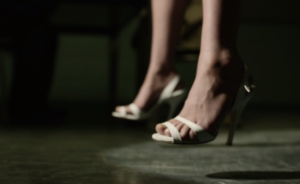
This also brings up a question as to where the three New Gods and their powers conflict, since all of them seem like they would dabble in the others’ territory. Media can’t simply be the god of television anymore, since so much entertainment is now concentrated on the Internet, which is the Technical Boy’s domain. And his wheelhouse would assumedly include all current machinery, right? But the surveillance photos from the bank came not from him, but from World, whose control would have to extend to most of that sort of thing if he’s so focused on systems.
Maybe that’s the point. If they’re the ‘Big Three’ of the New Gods, perhaps that top-tier status comes from a sharing and blurring of their individual strengths into a shared pool. It would explain why both World and Media showed up briefly on the surveillance camera back in “Head Full of Snow.”
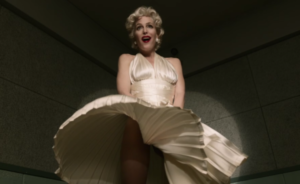
Final note: I’m not super thrilled by the fact that said ‘Big Three’ (and therefore all of the New Gods we’ve seen so far) are white, while the Old Gods are the ones mostly being played by actors of color. Now, there’s potentially a justification for this: Since they are reflections of people’s belief and the industries they represent, I suppose that could justify their appearance. I don’t know if the show is trying to make a point about institutional racism and inequality — white at the top and in control, everyone else at the bottom struggling to survive — via the hierarchy of the gods, or is just becoming typically one-sided in its representation. I’d like to think the former, but if that’s the case, the writers are going to have to do something to address it more clearly.
Back to the plot. A sulky Technical Boy comes in at World’s insistence, and is forced to give an apology for lynching Shadow. He claims that it was in “very poor taste” to do so to a black man, especially now, when America is in a “weird, tense place racially.” World, who apparently isn’t satisfied, slams him on the table and gives Shadow the chance to punch him. Shadow refuses.
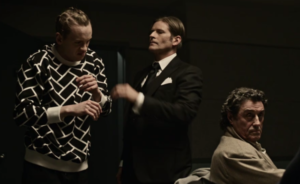
Dysfunctional family drama in the middle of our supernatural roadtrip drama? Sure, sure.
Blergh. This whole bit makes me super uncomfortable. I’m not sure how I feel about the Technical Boy at this point. Gaiman’s version was purposefully designed to be a caricature of the ‘Internet user’ that was (and still is, to some degree) popular back when the book was released: the overweight, pimply whiner who can’t socialize well with anyone but believes himself better than everyone else.
Fuller’s version has been updated for the times, but still seems tailored to fit a stereotype. Now, however, it’s of the temper-ridden, egotistical Reddit user who claims not to be racist/sexist while actually being super racist/sexist. He’s even sporting a black hairstyle in this scene, which is a blatant bit of appropriation that I’m mostly sure they did on purpose to drive home the point that his claim that he “doesn’t want to contribute” to the “hate” in the country is blatantly insincere.
I don’t know. I think it’s admirable for the writers to try to address the contemporary political climate, and it seems necessary given the story’s focus on the beliefs and ideologies of a country that’s currently embroiled in a lot of contention, but having it come from a bunch of white writers makes it seem at least partially ham-fisted and tone-deaf. Is it enough that they’re at least trying, or is it all just not working? I’m not sure. I’m also sort of put off by the ‘abusive parent’ dynamic that he has with World and Media. I suppose a god of technology would the be most youthful and rebellious of the three, given how recent its evolution has been, but it’s still unpleasant to see a younger actor get casually slapped around by older ones. Not that he doesn’t deserve a good punching, mind you. I would just prefer it came from Shadow.
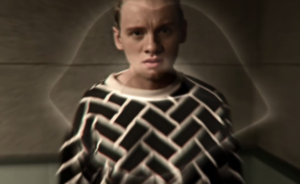
Aside from that, I’m wondering where they plan to take the Technical Boy from here. His ‘arc’ in the book was very strange, seemingly implying some larger importance to his character while ultimately not doing anything with it. If he’s going to show up more frequently, I get the sense that they have something more planned for him, but I can’t quite guess what that could be. A redemption story? A ‘growing up’ angle? Is he ultimately going to mess everything up and give Wednesday the advantage he needs?
In general, I’m torn on whether his portrayal as a stereotype is a smart or cheap move. It was what the text did, yes, but I wonder if it legitimately makes sense for a god to be so pigeonholed. Given that they are shaped by belief, it would make sense for him to take this shape if the majority of the country still to some degree put stock in the archetype. But do many people still think that image is a legitimate one? Or would it even matter if they did or not, so long as the thought was a widely prevalent one? And, given what Wednesday mentioned about there being multiple versions of Jesus running about, does that mean that there could be different Technical Boys encompassing other viewpoints somewhere out there?

Bah. Too many questions. I’m thinking too much into this. I blame Gaiman for his ideas, and the writers for taking them even further. I guess my ultimate question is: Does a very on-the-nose embodiment of whatever it rules over make sense for a god’s personification, or play out as a cheap and easy solution for something more complicated?
Anyway! The Technical Boy begrudgingly offers to use his services to help Wednesday evolve, to help him impact opinions, behaviors, and beliefs “like never before.” World, it seems, wants to offer Wednesday a “merger” and upgrade.
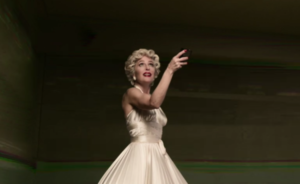
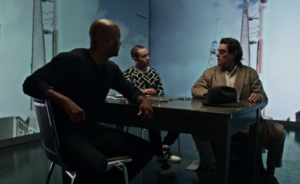
And you get a missile! And you get a missile! Everybody gets a missile!
World explains that individualists like Wednesday don’t “work” anymore — everything is global and systematic now. You have to incorporate or get out. Media hits a remote and turns the walls into television screens to demonstrate their idea for Wednesday: launch a missile (called ‘ODIN’) at North Korea and rain lightning on the population. Wednesday’s name will be given new meaning, but remembered, and as a result, he will be new and lasting and forever.
You know, this show is already very weird, and I was fully expecting it to be, but it still manages to slip in a scene or two every week that takes me aback. Last week, it was Laura sticking herself in a hot tub to breathe in insecticide. This week, it’s Marilyn Monroe triumphantly talking about novelty in front of a giant screen displaying both weapons of mass destruction and unicorns.
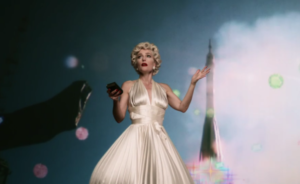
Granted, I think it’s an excellent sequence. As I mentioned earlier, I like this episode largely because of how it gets the New Gods more involved in the plot, and this moment — them making it clear that they know what Wednesday is up to and trying to offer him a deal — does that perfectly. It’s also a very creative concept, this ‘rebranding’ of Wednesday’s name into a modern weapon as a way of returning him to relevance. It’s another fascinating idea to add to Gaiman’s already clever premise: What would happen to Wednesday’s appearance, personality, and abilities if he was to exploit such a loophole? (And, as you’ll note, his real identity is now completely out there. In case you were still somehow unclear, Wednesday is Odin. Surprise.)
Wednesday, however, refuses, pointing out that they’re only here because he’s a flaw in their perfect system that annoys them. They don’t want to help him; they want to exile him. The New Gods, he says, don’t give meaning like the Old did; they just give people something to waste their time on.
World decides to leave. The Technical Boy is disbelieving in the fact that he’s letting his enemy go even though he has them already, but World claims that he wants to give Wednesday time to consider the offer, as he deserves their respect. “Fuck respect,” the Technical Boy snarls, so Media blows a kiss at him, which is powerful enough to knock out his teeth.
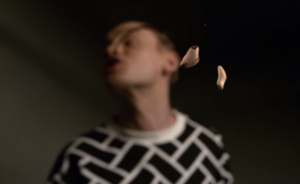
He definitely deserved that.
As they leave, Media informs Shadow that they’ll be telling the story of what happened there, and World cautions them that he is not their enemy.
I like where this is going. Media did hint at her and her kind being able to use their influence to make or break Shadow’s reputation in the book, but it never actually happened. He and Wednesday managed to fly under the radar for most of the plot, and while I don’t want the show to place too much emphasis on the human side of things, it would add a nice touch of drama if their being on the run from the law became a recurring idea, especially since it would let the New Gods flex their powers a bit more. The whole affair is a fitting way to ensure that the protagonists (and the viewers by extension) know that the opposition is real and onto them, not content to sit idly by and scoff at the underdogs who are (to nobody’s surprise) likely to turn their hubris against them.
Also, props to Gillian for another fun impression. Her spouting various well-known Marilyn-isms (including, of course, the bit addressed to “Mr. President”) and sporting a billowing dress are, like the Ziggy shout-out, rather over-the-top, but I think they makes sense. Iconic figures like Monroe and Bowie-as-Stardust, along with stories and ideas in general, tend to get boiled down and simplified into easily remembered soundbites and memes when diluted through our media, after all, so it would make sense for the embodiment of that to do the same with her personas. And while it’s sort of shocking, her kiss to the Technical Boy and the fact that it managed to hurt him is a solid confirmation that she can be a physical threat just as much as she can be a theoretical one.
(Her floating into the room with her spotlight-from-nowhere was one of the most striking things I’ve seen on television in a while. It was funny, creepy, and stylish all at once. I especially like how she drops the dazzle and walks out of the room normally once she realizes there’s no need to put on a show.)
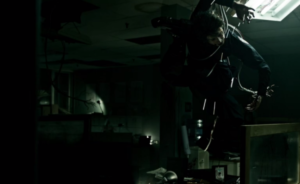
Shadow and Wednesday escape and make for the exit, finding the station riddled with bullet holes and dead cops, including Buffer and Cambro. As they make for the entrance, a knot in back of the wooden chair that Buffer’s body sits in (I think) blinks like an eye.
Outside, officers pull up with Sweeney in tow. Shadow and Wednesday flee to the back exit, only for Shadow to be attacked by the chair, which has grown into a sentient tree with numerous branch-like hands. It stabs its way through Buffer’s body and out into the hallway, but the pair make it outside. As the cops enter in through the front, Sweeney kicks out the cruiser window and runs.
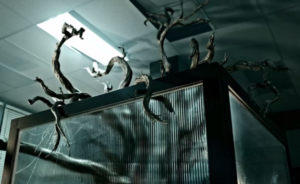
So, according to Fuller, this was our introduction to Mr. Wood. Probably one of the most drastic deviations from the source material, but I like the concept. If Mr. World was ‘upgraded’ from your basic spook to a straight-up god of (mostly) everything, it would follow suit to make the other Black Hats supernatural as well. I’m not sure what we witnessed here, though. Did Buffer’s soul possess the chair? If so, how did that happen, and why? Shouldn’t the character be ‘Ms. Wood’ now, then? Whatever the case is, making the character some kind of creature with a personal connection to Shadow rather than a dispassionate flunkie could make for some interesting storytelling. Perhaps we’ll get to see how the New Gods recruit their help? And it should make their later run-ins with Shadow more exciting, not to mention more credible.
I’m bummed that they killed of Buffer so quickly, though. I liked how Thoms played her — she made a fairly routine role rather likeable despite her few scenes — and it’s rather unfortunate that they decided to immediately discard one of the few women of color that the show has introduced. I suppose her ‘coming back’ could help rectify that issue, but I don’t think her being a CGI tree would really count.
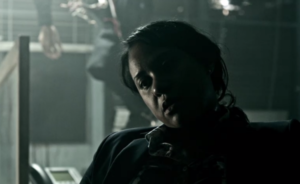
You will be missed. Though I won’t say ‘no’ to you coming back as a plant.
In a morgue late at night, an employee hears pounding coming from one of holding containers. The metal cover bursts out and kills him, and Laura rolls out on the gurney. She breathes on a mirror but sees nothing, and briefly touches the corpse of a woman nearby. She grabs her clothing from the evidence bag and leaves.
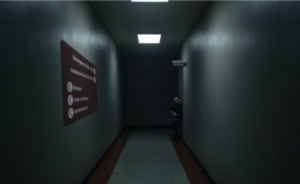
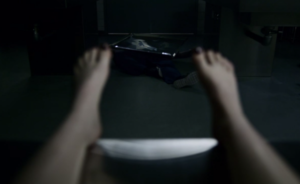
Solid way to end the episode. It subtly reinforces Sweeney’s earlier noting that Laura isn’t truly ‘alive,’ given that she’s unable to show signs of life despite her autonomy, and should act as a lead-in to whatever her new plans may be. I feel bad for the man she killed, though. He just wanted to listen to pop music and look at pictures of horses.

I really hope this is meant to be as innocent as it appears to be. Otherwise, I’m concerned.
Final thoughts:
- The writers will have to be careful about how they incorporate Media. As fun as it is to watch Anderson in her various guises, it could become tired and overly gimmicky if they do it too frequently. However, I definitely want her to show up more consistently, given her importance to the story and the fact that she always manages to give an otherwise fairly grim show a nice boost of perky, upbeat oddness whenever she graces the screen.
- This was our first episode not written by Fuller and Green, but nothing really felt off, which is good. Having so many different people sharing the job week to week can turn a show very inconsistent in tone and characterization (I’m looking at you, Glee), so let’s hope they keep it up.
- Where is Bilquis? She hasn’t shown up in several episodes now, and yet was given top billing for the season. I was under the impression she was going to have her own plot arc, but nothing has come of her yet.
*
So, a good episode. Different, but not in a bad way. It felt like a setup hour meant to reaffirm certain ideas already shown while getting new dynamics established for the rest of the season (and the next, probably). Which is sort of odd, because it feels like things are finally getting started, yet our first year is already nearing its end.
Still, “Lemon Scented You” manages to integrate entirely new scenes and developments into the book without feeling out-of-place or wrong, so I can’t complain. Give it another week or two, and I think we’ll have our groove down pat.
Rating
American Gods goes definitively off the beaten track for the first time this week with entirely new stories and ideas, and in doing so proves that it is more than capable of making its own mark on the material while still remaining faithful, entertaining, and weird.
A-


Carina Olsen
Twitter: CarinaOlsen
As always, such an awesome review Monteverdi 😀 So glad you enjoyed this episode a bunch. <3 But uuugh. I still haven't started watching. How rude. You make me more and more excited about seeing it soon, though 😀
Carina Olsen recently posted…Waiting on Wednesday #295